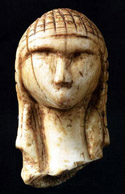Anthropology, Department of

Department of Anthropology: Faculty Publications
Document Type
Article
Date of this Version
1996
Citation
Journal of Anthropological Archaeology (1996) 15: 107-136, article number 0004.
Abstract
This paper examines systemic contexts for symbol use among the Maa-speaking Il Chamus in the Lake Baringo region of west-central Kenya. The systemic context for symbols and material culture consists of the environmental constraints and behavioral responses that characterize pastoralist life in East Africa. The author's interest in this problem developed in response to Ian Hodder’s work among the Il Chamus, Pokot, and Tugen in the Baringo District. Unlike Hodder, however, the author argues that symbols and their use in East Africa can be more productively explained from a materialist perspective. Specifically, it is proposed that symbols affixed to certain Il Chamus material culture reduce the uncertainties of food allocation within pastoralist compounds. The systemic context for symbol use, in this case, includes a number of bottlenecks, or constraints, that affect the production and the distribution of essential livestock products.
Following a discussion of livestock ecology, human nutrition, domestic group composition, and food allocation, the author uses Hodder’s data to evaluate an alternative explanation of symbols and material culture among the Il Chamus of west-central Kenya. The decoration and use of calabash vessels is discussed and evaluated, as are East African pastoralist adaptations, the nutrition and availability of milk, and polygyny among the Il Chamus.
The author posits that the theoretically-based approach to symbols, style, and information exchange proposed in the paper can be modified and applied to other human groups in the past or in the present.
Included in
African Studies Commons, Family, Life Course, and Society Commons, Gender and Sexuality Commons, Maternal and Child Health Commons, Place and Environment Commons, Regional Sociology Commons, Social and Cultural Anthropology Commons


Comments
Copyright 1996, Elsevier. Used by permission.